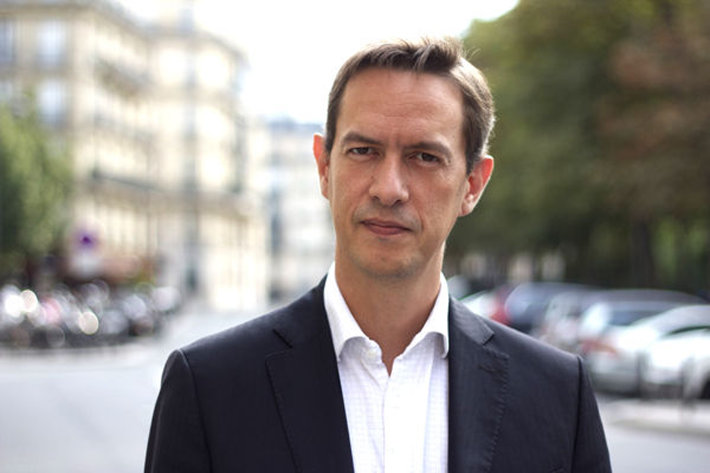Excerpts from an article published in the Faith in Faiths blog, featuring Rev. Eric Roux, President of the United Churches of Scientology of France and Vice President of the Church of Scientology European Office of Public Affairs and Human Rights. Faith in Faiths is a travel blog with a higher purpose—to share positive, uplifting and truthful content about faith and travel. It is written by a young woman who is traveling the world to search for people using religion for positive purposes.

My conversation with Rev. Eric Roux was one of the most interesting ones I’ve had during my last six months on the road. Rev. Roux is friendly, clean-cut, and intelligent…He is simply a man of faith who wants the freedom to worship as he chooses. And he wants to ensure that you can do the same.
When Rev. Roux was 20 years old, he read several books written by the founder of Scientology, L. Ron Hubbard, at the recommendation of his girlfriend. At the time, he had been exploring his own spirituality and reading about other religious and spiritual traditions, such as Christianity, Buddhism, Hinduism, and Greek philosophy.
“Scientology appeared to be the one that completely resonated with my aspirations,” he says. “Seeing that Scientology worked and was helping people, I had to ask myself what level of responsibility I wanted to have regarding my new religion.” Rev. Roux then decided to join the clergy of the Church so that he could help others benefit from Scientology.
However, in a country where 28% of people are not religiously affiliated and where the government has led a crusade against “cults” and “sects,” it’s not easy being a Scientologist.
“I began to see, to be confronted, with prejudice towards my religion much more than before,” Rev. Roux says. Specifically, he noticed that there seemed to be a large gap between what his religion was and what others perceived it as. People seem quick to label faith groups as “cults” when they do not understand what the faith stands for. It is an easy way of throwing up a wall between ourselves and people who are different.
Rev. Roux found that the labeling of his religion as a “cult” was damaging and inaccurate. As he began to interact with people of other faiths, he was struck by how frequently the term is used to describe religious groups. In Spain he found someone who thought Scientology was not a cult, but Opus Dei was a cult. Other countries, however, believe that Opus Dei is part of the Catholic church and claim Scientology to be a cult. Rev. Roux met some Greeks who believed that Eastern Orthodox was not a cult, but that Catholics and Protestants were cults. He met Russians who thought that anyone who was not Eastern Orthodox was in a cult. Clearly, what some people called sects or cults were considered mainstream religions in some countries but not in others. He found that the definition of a “cult” was relative and was used to delegitimize the religious beliefs of others.
However, the challenges of being a proud, practicing Scientologist in France did not relegate Rev. Roux to complacency; they motivated him to take action. After working as the Deputy Executive Director at the Scientology Celebrity Center in Paris, he worked with attorneys representing the Center in a trial in 2009. He provided them with evidence for the case and an understanding of how the Church operates and communicated with the media throughout the duration of the trial. After the trial, Rev. Roux began to work in external affairs for the Church, which includes advocating for religious freedom for and better understanding of Scientologists.
But what is most inspiring about Rev. Roux is that he fights for religious freedom not just for Scientologists, but for all people of faith. Facing much prejudice and criticism for his beliefs opened his eyes to similar struggles of people of other faiths. “What I found out is of course we weren’t the only ones suffering from prejudice.”
A country that prides itself on secularism and the separation of church and state, France has witnessed a steady growth in religious diversity in the post-WWII era. In response, it has passed laws increasingly banning expression of religion in the public sphere, which I discuss in a previous article, Religious Freedom in France.
A core value of practicing Scientologists is actively improving the conditions of their own lives and the lives of others, which served as motivation for Rev. Roux to begin a career advocating for religious freedom.
Rev. Roux chairs the Steering Committee of the European Interreligious Forum for Religious Freedom (EIFRF). Created in 2013, EIFRF is a group of Muslims, Sikhs, Eastern Orthodox, Catholics, Protestants, Jews, Buddhists and other people of faith who work together to promote freedom of belief, religious tolerance, interfaith dialogue, and knowledge of religions in Europe.
EIFRF leads regular roundtables, public lectures and conferences to discuss and take action related to international religious freedom. The organization also has a significant media presence and recruits experts to give opinions on legislation affecting religious freedom as well as sign letters sent to lobby governmental bodies and leaders.
EIFRF recently worked with members of the Parliamentary Assembly of the Council of Europe to pass a resolution protecting the freedom of religion of parents and children belonging to minority religions.
The group has also continued to call attention to the disintegration of freedom of belief in Russia, whose government recently imposed a complete ban on practicing Jehovah’s Witnesses in the country, by coordinating a written declaration in which 28 parliamentarians from 14 different European countries have called on Russia to end the persecution of religious minorities.
Rev. Roux, himself, travels all over the world both as a representative of the Church of Scientology as well as a fervent religious freedom fighter. This past year, he has engaged in dialogue with Israel’s Druze community, King Bassar of northern Togo, and spoken at countless conferences on religion in Europe.
From its beginnings, the Church of Scientology has recognized that freedom of religion is a fundamental human right. In a world where conflicts are often traceable to intolerance of others’ religious beliefs and practices, the Church has, for more than fifty years, made the preservation of religious liberty an overriding concern.
From persecution of religious minorities to issues revolving around religious worship, beliefs, rites, expression, association, dress, symbols, education, registration and workplace discrimination, religious freedom issues have achieved a prominent place in global headlines.
The Church publishes this blog to help create a better understanding of the freedom of religion and belief and provide news on religious freedom and issues affecting this freedom around the world.


